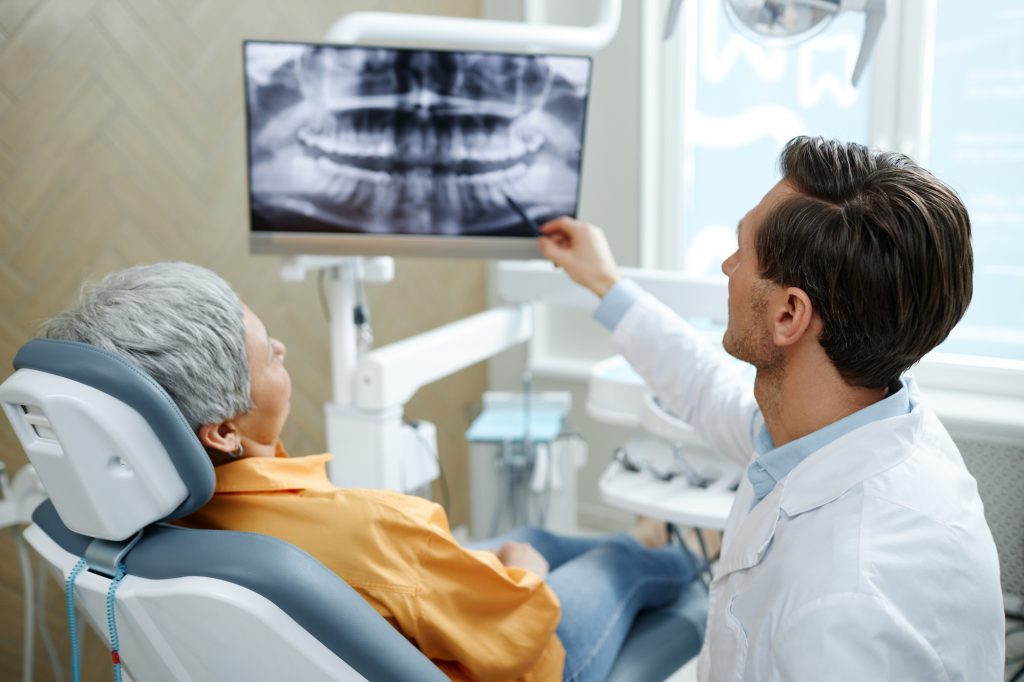Healthy teeth are vital for seniors, yet dental problems often increase with age. Tooth loss, decay, and gum disease are common among the elderly. These issues can lead to difficulties in eating, speaking, and can harm overall health.
This guide delves into teeth replacement options to help seniors regain their smiles and improve their quality of life. It’s more than aesthetics; it’s about maintaining the joy of a functional, healthy mouth. Let’s explore how revitalised smiles can lead to a happier, healthier life for seniors.
Benefits Of Teeth Replacement
Teeth replacement transforms lives beyond a simple smile. Here’s how it elevates the everyday experiences of seniors:
- Renewed Comfort And Confidence: Imagine biting into an apple without hesitation or speaking freely with friends. Teeth replacement restores these simple pleasures, bringing comfort and a boost of confidence.
- Enhanced Nutrition And Health: With a full set of teeth, seniors can enjoy a varied diet. This allows for better nutrition, which is crucial for health and vitality.
- Joy In Social Interactions: A bright smile can be a source of joy. It invites conversations and connections, enriching social lives.
- Ease Of Maintenance: Modern dental solutions like All on 4 provide ease of maintenance. They act like natural teeth, simplifying daily routines.
- Aesthetic Pleasure: A complete smile brings a youthful appearance. It’s not vanity; it’s about reflecting one’s inner vitality.
Teeth replacement offers seniors a chance to live fully. It touches every aspect of life, from a hearty meal to a spontaneous photo.
Teeth Replacement Options
When it comes to teeth replacement, seniors have several options. Each comes with its advantages and limitations. Here’s a rundown of the most common methods:
- Dentures: These removable fixtures are a traditional choice. They are cost-effective and non-invasive. However, they may require adjustments and can be less stable than permanent options.
- Bridges: A bridge fills gaps by anchoring to adjacent teeth. It offers a fixed solution and is more stable than dentures. But it demands strong natural teeth for support and can be more costly.
- Implants: Dental implants are a durable, long-term solution. They preserve jawbone health and function like natural teeth. The downside is they require surgery and have a higher initial cost.
Seniors considering tooth replacement should weigh the pros and cons of a dental bridge or dental implants to determine the best solution for their needs. The same careful consideration applies to dentures and other restorative solutions.
Each of these options can significantly improve a senior’s dental health and lifestyle. The best choice depends on individual needs, health conditions, and budget. A dental professional can guide seniors through these choices to find the best fit for a lasting, confident smile.
The Process Of Teeth Replacement
Embarking on the journey of teeth replacement involves several stages. Here’s what to expect:
- Consultation And Planning: Initial visits focus on evaluating dental health. Dentists may use X-rays or 3D imaging to design a personalised treatment plan.
- Preparation: Depending on the method chosen, this could involve preparing adjacent teeth, taking impressions, or scheduling for surgery.
- Teeth Replacement Procedure: Whether it’s fitting dentures, placing bridges, or implant surgery, this is where the transformation occurs. Advanced procedures may require several hours in the dental chair.
- Healing And Adjustment: Recovery times vary. Dentures might need immediate adjustments, while implants require months for the jawbone to heal.
- Follow-Up Care: Regular check-ups ensure the replacement teeth fit well and function properly.
Throughout this process, patients should expect a mix of appointments and recovery periods. Professional dental teams aim to make this journey as smooth as possible. They work towards the rewarding outcome: a functional, rejuvenated smile.
Caring For Your New Teeth
Proper care for new teeth ensures their longevity and function. Here are essential care tips for dental replacements:
- Daily Cleaning: Just like natural teeth, replacements need daily brushing. Use a soft-bristled brush and non-abrasive toothpaste. For dentures, use a cleaner specifically designed for them.
- Flossing: Use floss or interdental brushes. They help remove plaque around implants, bridges, and denture edges. Special flosses are available for those with bridges and implants.
- Rinsing: An antimicrobial mouthwash can aid in reducing bacteria. This is especially important for those with implants to prevent infection.
- Denture Care: Remove and rinse dentures after eating. Soak them overnight in a cleaning solution to keep them moist and maintain their shape.
- Regular Dental Visits: Visit the dentist every six months. They can check the condition of the dental replacements and perform professional cleanings.
- Avoiding Hard Foods: Be mindful of eating habits. Hard or sticky foods can damage replacements just as they can natural teeth.
- Immediate Attention To Discomfort: Report any discomfort or issues to a dentist immediately. This can prevent more serious problems from developing.
Maintaining dental hygiene with replacements is not just about sustaining the dental work itself. It’s about preserving the health of the entire mouth. Adhering to these practices can help seniors enjoy the full benefits of their dental replacements.

Back view of male dentist pointing at tooth X-ray image on screen during consultation in modern dental clinic
Conclusion
Teeth replacement offers a path to enhanced well-being for seniors. This guide sheds light on the options and care involved. The next step is crucial: a conversation with a dentist to align treatment with individual needs. Tailored advice ensures the most effective and comfortable outcome, paving the way for a resilient, vibrant smile.














